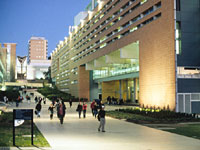|
|||||||||||||||||||||||||||||||||||||||||
| Medicinal Chemistry - 3992 | |||||||||||||||||||||||||||||||||||||||||
The Bachelor of Medicinal Chemistry is a professionally oriented, truly interdisciplinary program taught as a joint initiative between the Schools of Chemistry and Biotechnology & Biomolecular Sciences (Faculty of Science), and the Pharmacology section of the School of Medical Sciences (Faculty of Medicine).
Medicinal Chemistry is an exciting, rapidly-expanding area within the broad discipline of Chemistry that has seen enormous growth recently both within Australia, and globally. It is, quite simply, the development of new pharmaceutical agents, from Concept to Clinic. Many different stages are involved, from the design and synthesis of novel drug candidates, to their biochemical effects, testing regimes and regulatory and ethical considerations. The Medicinal Chemistry program had been designed to ensure that graduates will have a strong background in contemporary biology, biochemistry and pharmacology, based upon a solid foundation of essential chemistry. Graduates from the Medicinal Chemistry program will be equipped with a unique and wide harmony of skills, ranging from fundamental chemistry enabling the synthesis and analysis of drug candidates, through to relevant pharmacology and molecular biology skills. This combination will see graduates in high demand both locally and globally in pharmaceutical companies involved in modern drug design. In addition, the multidisciplinary nature of the program will mean that the graduates will also be highly marketable within other science-based industries and related fields. The research focus in the fourth Honours year, which provides projects that emphasise the interdisciplinary and collaborative nature of the area, will also enable students to progress seamlessly into a higher degree if they wish. Program Objectives and Learning Outcomes Graduates will obtain a broad education across a range of relevant scientific areas, as well as a strong grounding in advanced biological and chemical techniques. There will be particular emphasis on the medical sciences. The first year of the program will provide solid foundation knowledge in some fundamental areas of science – chemistry, mathematics, and biology- as well as specific graduate attributes courses. Year two and three will focus on chemistry, pharmacology and biochemistry, with a number of recommended electives to broaden a student's knowledge in relevant fields (physiology, anatomy, genetics). The fourth (Honours) year provides a substantial research experience.
Stage 1
Session 1 Session 2
PLUS
Free electives totaling 6 UoC (See Notes after Stage 3). Notes: CHEM1011 (Essentials of Chemistry 1A) and CHEM1021 (Essentials of Chemistry 1B) could be taken instead of CHEM1031 and CHEM1041, with permission of the Program Authority. Students intending to take 6 UoC of Level 1 Physics as an elective in Session 2 should substitute MATH1131 (Mathematics 1A) or MATH1141 (Higher Mathematics 1A) for MATH1031 in Session 1. The choice will depend on the level of Mathematics and performance in HSC or equivalent. Contact the Mathematics Office for further information. Stage 2 Session 1 Session 2
PLUS
12 UoC of electives (see the Note at the end of Stage 3). Stage 3 Session 1
Session 2
PLUS
18 UoC of electives (see Notes below) Notes: In stages 1, 2 and 3 there are 36 UoC elective courses (6 UoC in Stage 1, 12 UoC in Stage 2, and 18 UoC in Stage 3). Within this 36 UoC of electives, students must choose:
Approved Elective List (Stages 1-3)
BINF1001 Bioinformatics 1 (this course may be taken at Stage 1, or later)
Note: (BIOS2021 Genetics may be taken at Stage 1, or later. If taken in Stage 1, a credit or better must be achieved in BABS1201).
Stage 4.
For information regarding fees for UNSW programs, please refer to the following website: https://my.unsw.edu.au/student/fees/FeesMainPage.html
|
|||||||||||||||||||||||||||||||||||||||||



